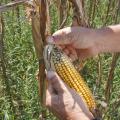Crop Report from 2008
By Patti Drapala
MSU Ag Communications
MISSISSIPPI STATE -- Fuel, feed and packers have Mississippi pork producers over a barrel.
According to statistics from the National Pork Board, Mississippi's hog production numbers over the last seven years (2000-2006) averaged about 470,000 head, which includes market hogs, feeder pigs and sows. But from 2005 through 2007, the average was about 434,000 head. Production at the end of 2007 totaled 412,000 hogs valued at $63 million.
MISSISSIPPI STATE -- Tropical Storm Fay was in the first wave of challenges facing Mississippi farmers during the 2008 harvest season as growers wait to see what future storms may bring.
Mississippi State University agronomists are reporting some benefits but mostly problems from recent wet, humid conditions. They all agree the timing of the storm called Gustav could hurt much more.
By Patti Drapala
MSU Ag Communications
MISSISSIPPI STATE -- Rice production in Mississippi this year boils down to a tale of two different crops in the field.
Farmers typically start planting rice about April 1 of each year and conclude around May 15. This year, only 75 percent of the crop was in the ground when untimely rains came during the latter part of the planting window. The wet weather pushed rice planting well into June, which meant 25 percent of the crop suffered a late start.
MISSISSIPPI STATE -- Mississippi's soybean crop is getting some “R and R,” but rather than producers having an easy time, their crop is battling seed rot and soybean rust.
Trey Koger, Mississippi State University soybean specialist at the Delta Research and Extension Center in Stoneville, said about 5 percent of the state's soybean crop was harvested by mid-September. In an average year, the crop would be about 30 percent harvested by that point.
MISSISSIPPI STATE -- Repeated, drenching rains from storms Fay, Gustav and Ike brought Mississippi's cotton crop from an anticipated above-average yield to one that appears to be average or below.
“With cotton acres being down, we really needed to hit a home run this year to retain the acres we had and to keep all the gins and the cotton industry infrastructure,” said Darrin Dodds, cotton specialist with the Mississippi State University Extension Service.
He said the state's cotton crop as a whole looked above average by Aug. 1, but it didn't last.
By Patti Drapala
MSU Ag Communications
MISSISSIPPI STATE – The spring freeze, summer drought and fall hurricane season of 2008 may have affected yield potential in many pecan orchards, but the industry watchers remain cautiously optimistic about the crop.
“Some of the trees have come back and are loading up pretty good with pecans,” said David Ingram, plant pathologist with the Mississippi State University Central Research and Extension Center in Raymond.
MISSISSIPPI STATE -- Corn farmers are finally completing harvest of what is possibly the state's second-highest average yield, but abundant rainfall caused delays, made harvest more difficult and hurt some grain quality.
Erick Larson, grain crops specialist with the Mississippi State University Extension Service, said repeated rains, relatively low temperatures and high humidity prevented corn from drying in the field as quickly as it should have.
MISSISSIPPI STATE -- Sweet potato yields and quality appear to be favorable despite rains that have harvest season running seven to 10 days behind schedule.
Calhoun County Extension director Charles Fitts said growers in Mississippi's sweet potato heartland are looking for good weather to finish harvest by the first week in November.
“If rainy weather slows growers down too much, potatoes will be at risk of losing quality when the ground freezes,” Fitts said. “So whenever field conditions are good, growers are working as quickly as possible.”
By Patti Drapala
MSU Ag Communications
MISSISSIPPI STATE -- Pumpkins do not grab the headlines as a significant crop, but they fill a niche for many Mississippi farmers who need to supplement cash flow.
“It's best to spread your effort out with several different enterprises because your farm is a business, after all,” said pumpkin producer Clay Meeks of Tippah County, who also grows soybeans and strawberries, and raises cattle. “It helps to have money coming in at different times of the year.”
MISSISSIPPI STATE -- Cotton farmers are trying just to put the season behind them after a year of struggling with the crop once called “king” in Mississippi.
Darrin Dodds, cotton specialist with the Mississippi State University Extension Service, said much of the state's crop looked good until early August, when tropical weather brought untimely rains to areas of the state.
MISSISSIPPI STATE -- State producers are harvesting the last of a large and generally good soybean crop after a scare from late summer rains that threatened to ruin most of the crop.
Trey Koger, soybean specialist with the Mississippi State University Extension Service, said about 95 percent of the state's soybeans were harvested by the end of October. The only beans remaining in the field were late-planted soybeans in the northern part of the state and along the river where spring floodwaters delayed planting.


